Although meowing is almost exclusive to the domestic cat, some cat owners are also known to meow at their feline friends from time to time.
Meowing at a cat could be a random or spontaneous action born out of sheer boredom. It could also be an attempt to stimulate or communicate with the cat. But here’s the most interesting bit. When you meow at your cat, you’ll normally notice that the cat meows back.
And the more you meow at the animal, the more enthusiastically he meows back at you. This may get you wondering if cats understand human language or whether they understand our meows in the first place.
But do cats understand human meows?
The perfect answer to this question is ‘they probably do.’ Meowing is a form of communication only observed in domestic cats. And as you shall find, cats developed meows primarily for communicating with their human parents.
However, to truly determine whether your cat understands your meows, it’s important to begin easy by understanding the fundamental differences between human and feline methods of communication.
If you’ve ever wondered, ‘can cats understand my meow,’ well this article is for you. Read on as we delve deeper into what human meows mean for cats and why your cat meows back at you.
Other areas this article shall explore include the meanings and implications of different cat meows, whether you should communicate with your cat by meowing, and what it means when your cat doesn’t meow at you.
Table of Contents
Fundamental Differences in Communication Between Humans and Cats
Humans generally communicate through language. The language can either be verbal or non-verbal. Verbal communication involves the usage of coherent words and phrases, whereas non-verbal communication entails various aspects of body language. Examples of non-verbal elements include gestures, tonal variations, and facial expressions.
Cats do not communicate verbally. However, they can communicate through a variety of means, including body language, scent, and trail positioning.
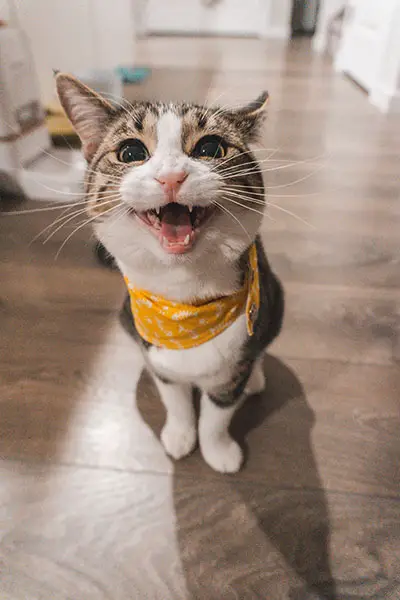
So, can cats understand human language?
The glaring differences in communication between humans and cats explains why it’s difficult for humans and cats to communicate with each other effectively. But note – the operational word here is ‘difficult,’ not ‘impossible.’
When you meow or otherwise speak to your cat, the animal will not really understand the actual words that are coming out of your mouth. However, they’ll most definitely know that you’re talking to them and acknowledge with a meow.
Maybe you’ve always wondered to yourself, does my cat understand when I talk to her?
As we’ve just indicated, your feline friend is incapable of understanding the words you’re saying. Nonetheless, they’re wise enough to know that you’re talking to them and will usually acknowledge with a meow.
In other words, your cat responding to you with a meow is a way of demonstrating that the animal is eager to communicate with you. That’s regardless of his inability to do so.
It’s also worth noting that cat meows are not made equal. Therefore, it’s best to establish the meaning of each meow so you can respond appropriately.
Why Do Cats Meow In General?
One way to answer the question, ‘why do cats meow back at you’ is by uncovering the reasons cats meow in general.
The first thing to note is that most meows are directed to humans. So, it doesn’t matter how many cats you have. Whenever they meow, just remember that the target is likely you or another human member of the household. This is particularly true if the cat in question is grown-up.
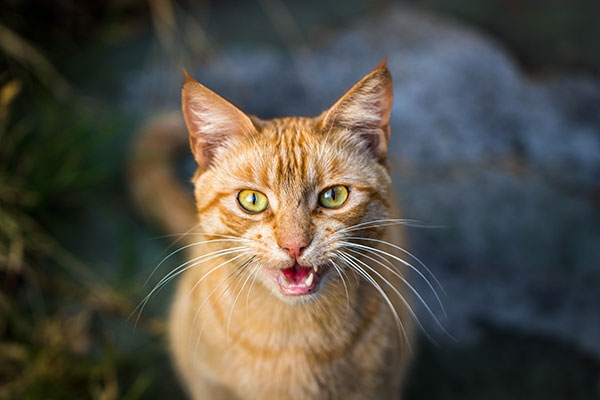
Unlike kittens and middle-aged cats, senior cats rarely meow at one another. Instead, they communicate with other cats through a raft of body signals (including postures and facial expressions), scent, and touch, preserving their meows almost exclusively to their human parents.
But just to clear things up, remember that cats also do meow at each other. Perhaps you were wondering, can cats understand each other’s meows? The fact that cats can meow at one another from time to time only means that they can understand each other’s meows.
Another thing to remember is that your cat will only meow at you when he’s trying to tell you something. Unfortunately, their message is usually clear enough. It’s upon you to find out what.
The following are common reasons why cats meow in general;
- They’re saying hello
- They’re trying to draw your attention to something
- They want to let you know that they want in on an action
- They’re hungry
- They’re in pain
- They’re in heat
- They’re anxious (usually of being left alone) or stressed out
- They’re scared or frightened
- They’re angry or agitated
- They just love you
Perhaps the most important thing to note here is that cats give out different meows depending on the specific message they want to put across.
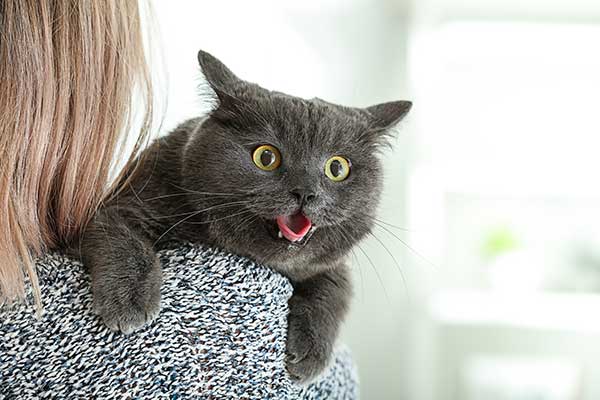
For instance, your kitto will give a short meow when he’s trying to say hello.
Several short meows could indicate that he’s either excited to see you or anxious that you’re about to leave the house.
Longer meows with a mid-level pitch could be indicative of an attention-seeking cat.
A long, low-pitched meow usually means the cat is sad and complaining. This type of meow is common with hungry cats.
Lastly, very short, high-pitched meows could mean your cat is very nervous and unhappy.
Why Do Cats Meow (Back) At Humans?
We’ve just highlighted some of the reasons cats meow in general. But you might still be wondering, what do cats think when we meow and why do cats meow back when you talk to them?
As we indicated earlier on, cats meow back at us in acknowledgment of what we’re saying to them. If you realize that your kitto meows at you immediately you say something to him, the chances are that the animal is trying to acknowledge you talking to him.
The following are other reasons your feline friend is meowing (back) at you when you meow or otherwise talk to him;
1. Greetings cum Excitement
One of the top reasons your cat meows back at you is that he’s excited to see you. Excitement-induced meows are most common when you return home after a long absence. It’s the cat’s way of saying ‘hello.’
Maybe you’ve always been grappling with the question, ‘how do cats say hello to humans?’ Well, meowing is one way cats say ‘hello’ to their human companions.
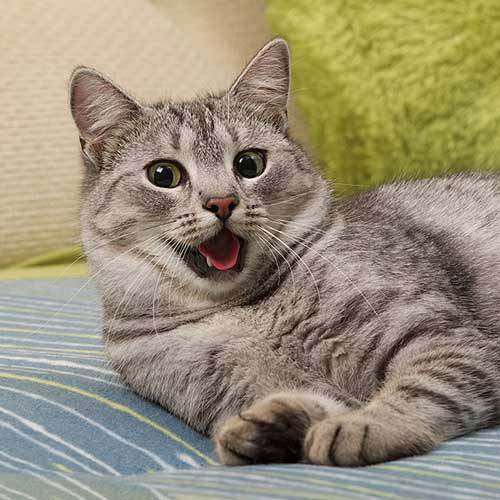
Another occasion when your cat may meow back at you as a form of greetings is when you wake up in the morning. Note that cats are crepuscular animals, which implies that they’re most active at dawn and dusk.
So, your kitto is usually already awake by the time your alarm bell rings. He may have been prowling around the backyard or simply starring at you snore while waiting for you to wake up so he can usher you into the new day with a heartwarming meow.
2. Stress and Anxiety
Cats meow when they’re happy to see their owners after a considerably long absence. On the other end of the spectrum, your cat could meow when he’s anxious about being left alone.
These types of meows are common whenever you’re about to leave the house for work. By meowing at you, your furball is trying to tell you how difficult it will be for her to cope in your absence.
You can help your cat out by getting him enough toys to keep him stimulated whenever you’re gone. You could also hire a professional pet sitter. Otherwise, leaving a cat alone and without enough stimulation could cause him to develop a full anxiety disorder, such as separation anxiety.
3. Fear
When a cat is frightened, meowing is usually one of his immediate natural responses.
Several things could make your cat afraid and begin to meow. Common triggers include unfamiliar sounds (like that of fireworks or cars racing on the freeway) and unfamiliar sights (like that of a new family dog).
When fear is the main reason your cat meows, you should be able to observe various other aspects of body language that denote agitation. Examples include flattened ears, tails tucked between the hind legs, pacing, and restlessness.
4. Attention-seeking Behavior
Meowing is one of the numerous ways cats normally seek their owner’s attention. The reasons for these kinds of meows range from hunger and thirst to a need for petting and grooming.
A cat will also meow at you while trying to get you to clean his bowl or trying to lure you into playing with him.
In some instances, the animal may have detected a suspicious person or creature in the compound and trying to get you to check them out.
5. Hunger
Nearly every cat owner is familiar with hunger-induced meows. When your feline friend is famished, don’t expect him to just put a pitiful face like dogs do, hoping that you’ll figure it out and feed them. Instead, they’ll give out repeated meows that leave no doubt as to what they want.
Hunger-induced meows tend to be common around a cat’s regular feeding hours. But they can also occur if a cat picks up an inviting aroma of human foods in the kitchen.
In the latter case, the cat may not necessarily be hungry. He just wants a piece of the yummy food you’re preparing.
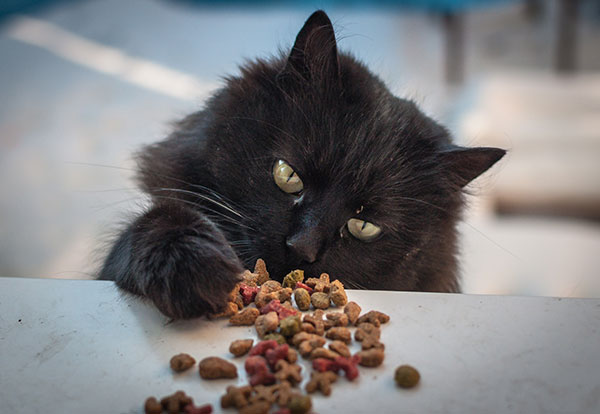
6. Pain
Pain-induced cat meows are also unmistakable. The one defining feature of all pain-related meows is their high-pitch nature. The meows can be short or long, depending on the amount of pain a cat is in.
For instance, a cat will give a very short, loud meow if you happen to step on his tail. He may even hit back with a bite or scratch.
On the other hand, a long, high-pitch meow could suggest that a cat is suffering from a continuous form of pain. The pain might have been triggered by a physical injury or underlying disease.
7. Anger or Frustration
Cats, like humans, also get angry from time to time. Your cat can get mad at you for what you’ve done or haven’t done.
Unfortunately, cats cannot vent their frustrations using human language. Instead, they may choose to register their displeasure by giving a short, high-pitched meow.
Note that an angry cat is a potentially dangerous animal and should be approached with extreme caution. If you pick up any signs of annoyance or aggression, it’s best to let the cat alone so he can blow off some steam.
8. Affection
A cat may also meow back at you as a way of demonstrating his love and affection for you.
You could be snuggling on the couch binge-watching your favorite Netflix series when suddenly, your cat comes to you and starts to meow.
If the meows are accompanied by other behaviors like head-butting and purring, then the chances are that your kitto is just trying to be affectionate.
- High protein cat food dry formula with real chicken as the first ingredient
- Natural with prebiotic fiber nourishes specific intestinal bacteria for digestive health
- Wholesome cat food dry kibble with vitamin A and Omega-6 fatty acids to nourish skin and coat
Last update on 2024-07-22 / Affiliate links / Images from Amazon Product Advertising API
9. Other Reasons
In rare circumstances, your cat can meow back at you when he’s in heat. This could be a humble appeal to get him or her a sexual companion.
Also, a cat can meow back at you when he doesn’t understand what you’re saying or doing. In this case, meowing is their human version of saying, ‘I beg your pardon.’
What Do Cats Think When We Talk To Them?
Even after highlighting all the possible reasons cats meow at their owners, you may still be wondering, can cats understand what we say?
Again, cats cannot understand what we say. Talking or meowing to a cat is what baby talk is to a toddler. Your cat may interpret your words or meows to mean anything, depending on the pitch, duration, and strength of your words.
But one thing that’s for sure is that cats will usually meow back whenever we talk to them, ostensibly as a way of acknowledging that they know we’re addressing them. How they react thereafter depends on how they processed the message.
If your cat flees and hides when you talk to him, it means he got scared. And if he approaches you, then it means the animal understood the meow as a plea for attention.
Another thing we know for sure is that cat’s don’t just meow for the heck of it. Instead, each meow usually has an underlying message. It’s important to interpret your cat’s meows accurately so you can determine how to respond. This is the only effective way to avoid situations where your cat would be meowing incessantly at you, hoping that you figure out what their problem is.
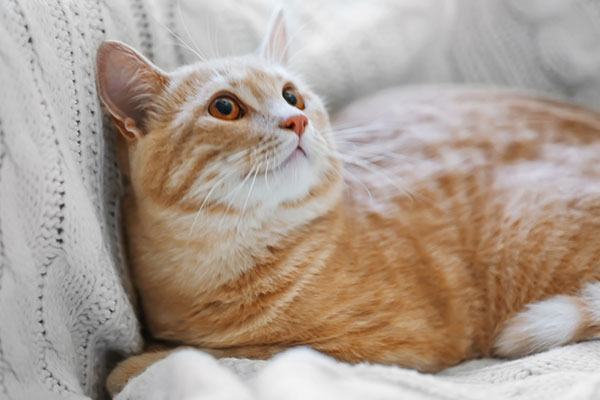
Fortunately, it’s not difficult to know what a cat’s meow indicates. That’s because each meow is often accompanied by other aspects of body language that might clue you in on what the animal needs. For instance, long, high-pitched meows accompanied by baring of teeth is definitely an indication of an angry or agitated cat. Meowing while purring and head-butting suggest excitement and affectionate behavior.
Can Cats Understand Human Language?
For the most part, cats don’t understand human language. That’s for the simple reason that kitty language doesn’t involve verbal communications. But there are exceptions.
A majority of cats have names. And many of these cats generally answer to their names. So, how do they respond if they can’t understand verbal communications?
Well, like dogs and other common household pets, cats can master certain words over time. Besides the sound of their names, most housecats also understand basic words like “come,” “go,” “no,” “stop,” “food,” “treat,” “dinner,” etc.
However, the fact that a cat can understand certain commands doesn’t mean you can converse with him. A cat named ‘Hessy’ may answer to his name alright. The cat may also associate the word ‘stop’ with a command to stop whatever he’s doing. But the situation changes drastically when you combine the two words. Saying ‘Hessy stop’ may leave the cat struggling to respond to this seemingly unfamiliar command.
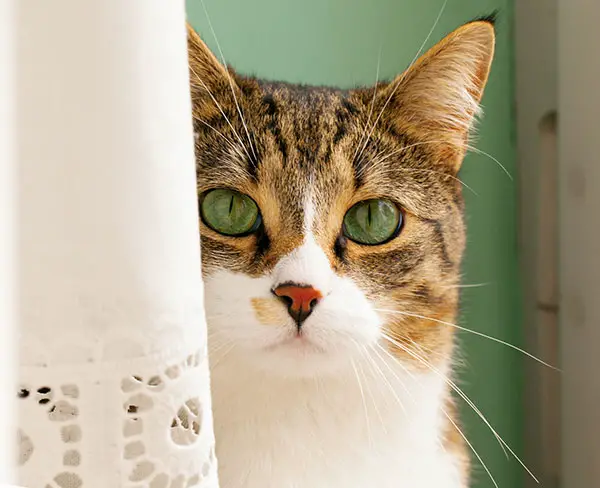
Also, while cats can understand a few commands, they’re incapable of responding to cues. So, addressing your kitto as “mummy” or “cutie” will only leave him even more confused.
Interestingly though, cats have a way of processing human emotions. Your cat will always know when you’re happy or sad.
One frequently asked question by many cat owners is….
Do cats understand when you cry?
Yes, cats understand when we cry. This is mainly because humans and cats have near-similar genetic, neurological, and hormonal makeups. Although cats don’t exactly cry like we do, they have the same neurological functions involved in the expression of sadness and grief as humans.
- Fun Mealtime: With this slow feeder, your cat’s natural urge to hunt will emerge playfully and naturally! The Catit Senses Food...
- Stimulates Natural Behavior: Features multiple levels that encourage natural pawing behavior in a fun manner. Designed to help...
- Additional Features: Wide and durable base prevents tipping. Made from BPA-free materials. Narrow top opening prevents cheating....
Last update on 2024-07-22 / Affiliate links / Images from Amazon Product Advertising API
Do Cats Only Meow At Humans And Is It OK To Meow Back At Your Cat?
Cats generally meow at humans. It’s difficult to find a cat meowing at a fellow cat except in the case of kittens. Kittens still relying on their mom for food and grooming may meow as a way of trying to get their mom’s attention.
A kitten’s meows is also a way of expressing affection for his littermates. But as cats grow older, meowing becomes almost an exclusive human-directed communication.
Is it okay to meow back at your cat?
Meowing at a cat serves numerous purposes. It enhances human-cat communication and bonding. It can also stimulate the cat. However, it’s important to establish whether your cat loves being meowed at. While some cats find the sound of their human meows stimulating, others get irritated by it.
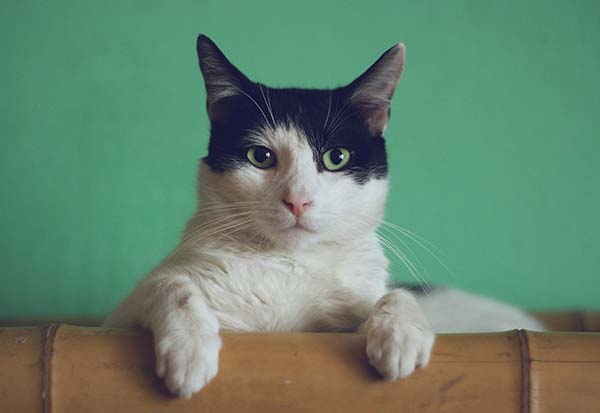
Should I worry if my cat doesn’t meow at me?
Meowing is ingrained in a housecat’s DNA. So, you should be worried if your furball doesn’t meow at all (or frequently enough).
However, there’s usually no cause for alarm if your cat doesn’t meow back at you. As we’ve pointed out, some cats love being meowed at and will acknowledge by meowing back, whereas others detest the sound of human meows.
Conclusion
There are several reasons why cats meow at their human owners. For the most part, cat mews are natural kitty behavior and shouldn’t be a cause for concern. The only challenge is to uncover the meaning of each meow so you can respond accordingly.
Checkout Our Favorite Cat Products
1. Best Online Course For Cat Parents
Our favorite: The Cat Language Bible (How to Finally Understand And Speak to Your Cat) – A new form of cat to human communication that many cat owners have dreamed about… but few have actually thought possible.
2. Best Immune Support For Cats
Our favorite: Tomlyn Immune Support – Best Supplement for Cats and Kittens.
3. Best Cat Treats
Our favorites: LIFE ESSENTIALS All Natural Freeze Dried Chicken And Sheba Meaty Tender Sticks – Both are Great.





